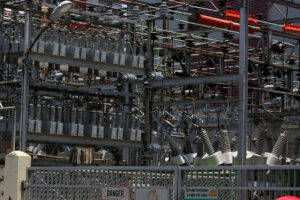By John Victor D. Ordoñez and Kyle Aristophere T. Atienza, Reporters
CONGRESS should tackle measures that seek to ensure transparency and accountability in power generation via changes to the two-decade-old Electric Power Industry Reform Act (EPIRA) to ensure fair electricity prices for Filipinos amid constant blackouts, economists said at the weekend, as sessions resume this week.
“Addressing longstanding power issues should be a top priority,” John Paolo R. Rivera, a senior research fellow at the Philippine Institute for Development Studies, said in a Viber message. “Amending EPIRA can help reduce electricity costs, improve reliability and attract investments in renewable energy.”
The House of Representatives would focus on exercising its oversight functions, continuing inquiries on food smuggling and mounting power prices, Senior Deputy Speaker and Pampanga Rep. Aurelio D. Gonzales, Jr. said in a separate statement.
The chamber would also take up bills seeking to improve the productivity of small businesses, amending the Universal Healthcare Act, and start discussions on the creation of a “national flood control plan,” he added.
“We will continue to strengthen the oversight power of the House to address irregular activities… [and] wrongful practices that lead to high prices of food and electricity,” he said. “We are uncovering the mechanisms that allow cartels to thrive, and this House is determined to dismantle these networks of greed.”
Mr. Rivera said Congress should also push bills that would incentivize investments in the renewable energy sector to help the country diversify its energy mix.
The Philippines is under pressure to find other sources of indigenous energy with the imminent depletion of the Malampaya gas field, where the country gets a fifth of its power requirements. The gas field is expected to run out of easily recoverable gas by 2027.
The government aims to raise the share of renewable energy in the country’s energy mix to 35% by 2030 and to 50% by 2040 from 22% now.
Senators and congressmen return from holiday break to tackle pending priority measures, such as proposed changes to EPIRA, the Rightsizing bill and a measure that seeks to enhance the country’s fiscal regime for the mining sector, among other measures.
“A better direction for the power industry would be steady measures towards nationalization with much greater public transparency and accountability to check performance,” Ibon Foundation Executive Director Jose Enrique “Sonny” A. Africa said in a Viber message. “Unfortunately, the EPIRA fundamentally gives unwarranted emphasis on private profit-seeking players.”
In his third address to Congress, President Ferdinand R. Marcos, Jr. sought a review of EPIRA to address issues hounding the energy sector, particularly high energy prices.
The House energy committee in November approved a bill that would give the Energy Regulatory Commission (ERC) “quasi-judicial, quasi-legislative and administrative” powers to fast-track the resolution of pending applications and cases.
Energy Undersecretary Sharon S. Garin earlier urged senators to amend the Energy Regulatory Commission (ERC) charter to allow price increases without regulatory approval as long as these fall within a set benchmark or bracket.
This would allow the ERC to do away with the cumbersome approval process that power distributors have complained about, she told a Senate energy committee hearing that is looking at changes to the 23-year-old EPIRA.
“The Senate leadership should try to do more, particularly amendments to the EPIRA, as this might translate to better and lower prices for consumers nationwide,” Terry L. Ridon, a former congressman and a public investment analyst and convenor of think tank InfraWatch PH, said in a Facebook Messenger chat.
Mr. Rivera said a measure that seeks to cut the tax on stock transactions from 0.6% to 0.1% would encourage more Filipinos to invest in the stock market.
“Reducing the stock transaction tax can also stimulate activity in Philippine capital markets, attract more foreign and local investments and promote financial inclusion,” he said. “These reforms would also enhance the capital market’s role as a source of funding for businesses.”
Senator Sherwin T. Gatchalian, who filed Senate Bill No. 2865 or the Capital Markets Efficiency Promotion Act earlier said lowering the stock transaction tax would make the Philippines’ capital market more competitive with its regional peers.
Citing a forecast by the Philipine Stock Exchange, the senator said the lowered 0.1% stock transaction tax would boost stock trading to P4.9 trillion by 2029.
But Mr. Africa said the government is better off taxing billionaires and big businesses to generate revenues for investment in social services, agriculture and for micro, small and medium enterprises (MSME).
“Cutting taxes on financial transactions just benefits wealthy and institutional investors at the expense of public revenues,” he said. “This will just add further pressures for fiscal austerity, which always disproportionately falls on social services.”
Congress will be in session until Feb. 7 before it adjourns for four months to give way for the 2025 midterm elections.
Filipinos on May 12 will elect 12 new senators and members of the House. All local positions are also up for grabs.
Mr. Gonzales said they would discuss a bill that seeks to enhance the productivity of MSMEs through shared-use equipment and resources, which could help make them become “globally competitive.”
Amendments to the Universal Healthcare Act would also be tackled to “improve benefit packages and adjust premium contribution.”
The House would also look at establishing a unified flood control program nationwide to address recurring flooding in disaster-prone areas, he added.
Congressmen will also deliberate on pending education bills including proposals to create a voucher program for private senior high school students and set up a private education bureau, Mr. Gonzales said.
















